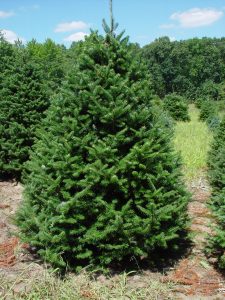
- Published: June 1, 2021
- Author: Evan Van Slooten
Exotic Conifers: The Canaan Fir
Michigan’s weather has become increasingly more unpredictable and extreme, which does not bode well for some of the ‘tried and true’ conifers that Christmas tree growers are familiar with. Now, growers are shifting their efforts towards exotic Firs, which can be less finicky alternatives.
Exotic tree species are considered those not native to our area. When used in the context of Christmas trees, the term “exotic” means “less common or unusual” according to the MSU Extension. In this informational series of posts, we will explore different types of exotic Firs. Previously, we discussed Trojan Fir, also known as Abies equi-trojani. Today’s edition of the Exotic Fir series will dive into the attributes, as well as pros and cons of growing Canaan Fir (Abies balsamea phanerolepi).

Attributes of Canaan Fir
Canaan Fir is a variety of Balsam Fir (Abies balsamea), but has similarities to both Fraser and Balsam Firs, according to the National Christmas Tree Association. Canaan Fir is sometimes described as a hybrid between the two, but the MSU Extension says it is actually a specific seed source from Balsam Fir from the Canaan Valley of West Virginia.
The Canaan Fir is an attractive, medium-sized conifer with a traditional evergreen shape. Its dense foliage is dark green in color with a silvery-bluish shaded underside.
Canaan Fir are soft and fragrant, and are excellent choices to use as privacy screens, windbreak, erosion control, ornamental landscaping, accenting specimens, and of course, as Christmas trees. At its full growth, this species of conifer can reach 40-50 feet in height and can have a spread of 20-25 feet.
Pros and Cons of Growing Canaan Fir
An important asset of Canaan Fir is its ability to grow in areas not well suited to other native firs. It will tolerate wetter soils than Fraser Fir and is more resistant to spring frost injury than either Fraser or Balsam Fir because of its tendency to break bud later, alleviating some losses, according to the MSU Extension. They can also tolerate drought once established.
While Canaan Fir will tolerate soils with less than perfect drainage, they perform best in ample moisture and rich, acidic, well-drained soils. This species of Fir also prefers a cooler climate. Some other pros of growing Canaan Fir include:
- Color variety: The soft-needled species can vary in colors from green to blue-green to silvery-green.
- Fragrance: Decent, similar to balsam.
- Branches are reasonably sturdy.
- Can be shipped dormant.
Fraser Fir is considered very susceptible to Phytophthora root rot, while Canaan Fir, which are closely related to Fraser, have been reported to survive in soils conducive to Phytophthora. Phytophthora is a soil-borne, water mold that infects trees, woody plants, and even vegetables. The name Phytophthora derives from Greek, meaning “plant destroyer.”
Phytophthora root rot is a common disease of Christmas trees including Douglas, Balsam and true firs, which includes Canaan Fir, as well as Spruces, and Pines. According to the University of Wisconsin-Madison, the disease has caused significant problems in Christmas tree production in several states. It is the number-one disease of nursery crops nationwide, according to Oregon State University.
Another con is that Canaan Fir are susceptible to Balsam woolly adelgid (BWA) infestations. The tiny, wingless pests can destroy true firs. BWA are small purplish-black insects that feed on sap. Adult BWA form white, waxy “wool” that covers twigs, branches, and stems of infested trees. The pests burrow within the fir’s bark and leave poisonous saliva behind. Repeated attacks weaken trees, cause twig gouting, kill branches and, over the course of several years, cause trees to die, according to the Michigan Department of Agriculture and Rural Development.

In commercial production of Canaan Fir, BWA infestations can be treated but growers have to be vigilant – the damage done by BWA, much like the emerald ash borer’s effect on the American ash three, is mostly invisible until it’s too late.
Another con of growing a Canaan Fir include their needle retention, which is good, but not quite up to Fraser or Douglas Fir standards.
Consider Growing Canaan Fir
Christmas tree growers produce Exotic Fir to give customers a wider range of choices, and in some cases, these species may be modified to adapt better in certain soil and climate, like the Canaan Fir.
If you’re considering growing Canaan Fir in your business, click here to order some off of our eCommerce store today or give us a call at (800) 888-7337 for more information.





